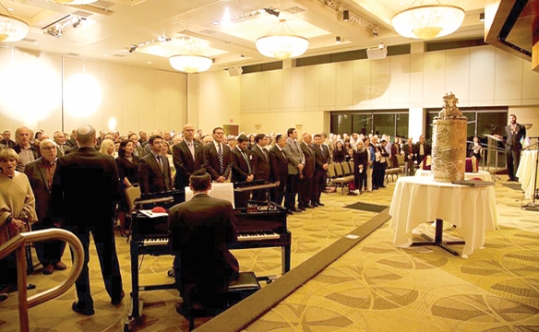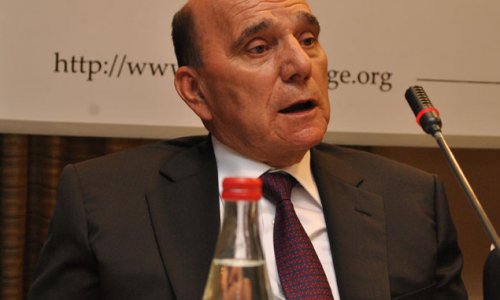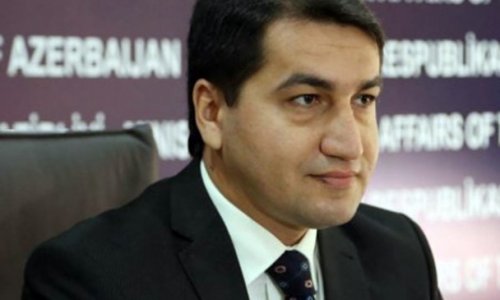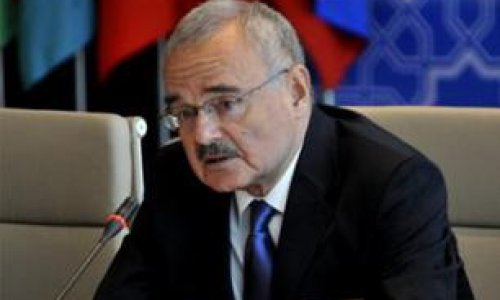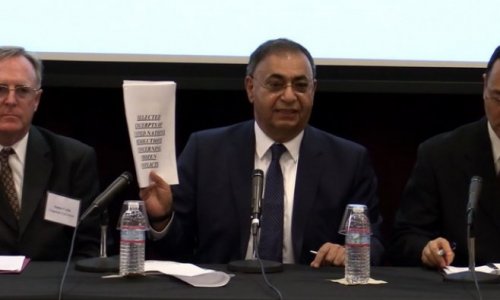Diplomats from the world’s only Jewish state and a predominately Shiite nation met in Westwood Feb. 3 — and got along perfectly.
The consuls general from Israel and Azerbaijan met in a well-attended public forum at Sinai Temple to discuss economic, political and cultural ties between the two countries, and to witness the gifting of a Sefer Torah from the temple’s Men’s Club to leaders from the community of Mountain Jews who have long lived in the majority Shiite Azerbaijan.
The unusual event, which speakers frequently referred to as "historic,” emphasized cultural and historical bonds tying together Israel and Azerbaijan, a secular, former Soviet Republic nestled in the Southern Caucasus. An estimated 15,000-20,000 Jews live in the country, according to the National Coalition Supporting Eurasian Jewry.
"This relationship has a very strong human foundation, and that’s our wonderful Jewish community,” Azerbaijan Consul General Nasimi Aghayev said at the event.
"When we established, or rather restored, our independence in 1991, Israel was a natural ally for Azerbaijan, because there was already a strong foundation in our society. That’s why Israel was one of the first countries to recognize Azerbaijan’s independence, and one of the first countries to open an embassy in [the capital city of] Baku.”
The two countries do billions of dollars in annual bilateral trade, according to Israeli Consul General in Los Angeles David Siegel. Azerbaijan’s overall economy is dependent on energy exports; according to the U.S. Energy Information Administration, more than 90 percent of Azerbaijan’s total exports are oil and natural gas. So Azerbaijan sends oil to Israel, and Israel sends defense materials to Azerbaijan.
But the relationship extends beyond oil and arms. Israel is Azerbaijan’s fourth largest trading partner, dealing in telecommunications, cybersecurity, education and agriculture, according to The Begin-Sadat Center for Strategic Studies.
"This is a model for how Jews and Muslims can get along in the Middle East,” Siegel said.
Asked by the panel’s moderator, Rabbi Erez Sherman of Sinai Temple, how Azeris have created a culture of interfaith tolerance — between Jews, Muslims and other religions — both within and outside of their borders, Aghayev said, "For centuries it has been the case that these ethnicities, these religions, have coexisted together. And this was due to the fact that Azerbaijan was a crossroads of different cultures and civilizations.
"But, of course, you can’t forget the role of the government,” Aghayev continued. "Government can foster tolerance, or government can steer away and do stuff that is not so positive. In our case, since the very beginning, the government of Azerbaijan has strengthened this tolerance, strengthened this interfaith harmony.”
Three members of the Mountainous Jewish community traveled to Los Angeles to accept the Sefer Torah – Milikh Yevdayev, chairman of the Mountainous Jewish Community; Edva Abramov, a member of the Azerbaijani Parliament; and Rabbi Avraam Yakubov of the Mountainous Jewish Synagogue in Baku. With the assistance of translators, all three participated in a group interview with the Journal prior to the ceremony, as did Gunduz Ismayilov, deputy chairman of Azerbaijan’s State Committee for Religious Institutions.
Aghayev stressed that the Azeri government is devoted to democratic and secular values, and that it views defending all religious groups and supporting interfaith dialogue as one of its duties.
Yevdayev seconded Aghayev’s sentiment: "We celebrate each other’s holidays. We share in each other’s joys and also pains,” he said.
"Jews have lived in Azerbaijan for 2,500 years, Christians since the first century, and Muslims since the seventh century,” Ismayilov said.
In recent years, the Azeri government has provided financial resources to many of the country’s religious groups, including the Mountain Jews. In 2012, Azeri President Ilham Aliyev’s government gave money to build the Mountain Jews a new synagogue in Baku, where the Sefer Torah given by Sinai Temple’s Men’s Club will reside.
Rabbi David Wolpe of Sinai Temple led the effort to raise the funds to acquire the Torah, which was written in Israel by Rabbi Avishai Smila over the past year, and completed by members of the Men’s Club in Los Angeles prior to the ceremony.
It all began a year ago with a conversation between Wolpe and Yevdayev, who was making his first trip to the U.S. When asked what the community in Azerbaijan needed, the latter’s answer was simple: a Torah. So Wolpe approached the Men’s Club and the rest is history.
"The Torah, according to our sages, is the ketubah — it is the marriage contract between God and Israel — and Sinai was the chuppah, it was a marriage canopy. So when you give a Torah to another community, it is also like giving a ketubah, like giving a marriage contract, and it binds the two communities together,” Wolpe said as he presented the new Torah to Yakubov.
Members of the visiting delegation also emphasized the forging of a new bond between Jewish communities in Israel, Azerbaijan and the United States. "Sons of Israel live in different parts of the world, but despite this fact Jerusalem and the sacred Torah unite us all,” Abramov said while addressing the event’s attendees.
Moreover, the governmental bond between these three governments extends beyond trade and mutual support of religious tolerance. Azerbaijan sent soldiers to Afghanistan and Iraq as a part of various U.S.-led coalitions, and there has been speculation in American and Israeli press as to whether Aliyev’s government has secretly assisted Israel in combatting Iranian nuclear capability.
Despite this collective public support of each other’s efforts, there are some signs in the United States of a growing unease with Azeri politics. Most significantly, Aliyev has faced criticism in the American press for using his authority for repressive, autocratic ends.
Aghayev and Abramov both told the Journal that the Azeri government has not participated in human-rights abuses or unjustified prosecution of members of the press.
"Nobody is being persecuted for journalistic activity, but if someone commits a crime there should be justice according to the law,” Abramov, who belongs to Aliyev’s New Azerbaijan Party, said during the group interview.
Accusations of misuse of power have been overblown in the Western press, Aghayev asserted.
More important, insisted Abramov, are Azerbaijan’s supportive relationships with Israel and the United States — bonds that undoubtedly reached new depths at Sinai Temple.
"Today, a dream is coming true,” Yevdayev said at the event.
(jewishjournal.com)
ANN.Az
Follow us !

